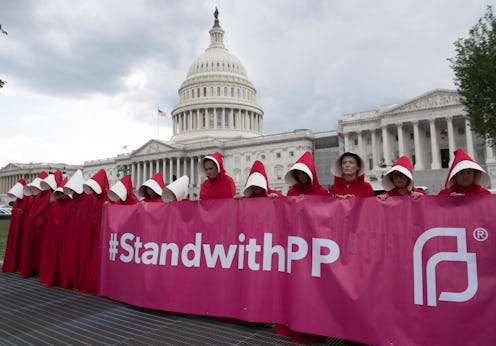Life
What The Birth Control Mandate Rollback Means For Trans And Gender Non Conforming People

On Friday, the Trump administration announced new rules that will affect the ACA birth control mandate that requires companies to cover contraception for its employees, as is preventative medicine. The administration’s new rule now allows for employers to cite “religious” or “moral” reasons to not cover no-copay birth control for its workers. This new ruling, which completes a Trump campaign pledge to expand "protections" for "religious liberty," will have a devastating impact on anyone who uses contraception. Trans and gender non-conforming people, in particular, will see an enormous negative impact from this decision, in addition to the estimated 55 million women who have benefitted as a result of the Obama-era mandate.
In a statement provided to Bustle, Sarah Kate Ellis, President and CEO of GLAAD, called the announcement an “excuse to deny healthcare to … an untold number of transgender and nonconforming people.”
“The Trump administration is actively cloaking controversial policies under so-called ‘religious exemptions’ when the policies, in fact, directly attack marginalized communities who often experience discrimination at a daily basis,” she continued. Dr. Jenn Conti, a fellow with Physicians for Reproductive Health who works with transgender individuals, echoed that sentiment. “This is a community of people who are used to not being able to access medical care that’s specific to them for fear of being targeted,” she tells Bustle. “You’re targeting an already vulnerable population of individuals” in rolling back access to safe, affordable, and accessible contraception.
Transgender and gender non-conforming people are often left out of the conversation about access to birth control, but that is a damaging stance leading back to how we frame the narrative around birth control. It isn’t just contraception — it is preventive medicine, a fact acknowledged by the original mandate that was written into the Affordable Care Act. “‘Birth control is sort of a misnomer” for some people, Dr. Conti explains. In a statement provided to Bustle, Cecile Richards, President of the Planned Parenthood Federation of America said, "58 percent of all women who use the pill rely on it, at least in part, for something other than pregnancy prevention, including endometriosis, polycystic ovarian syndrome — which is prevalent among women of color— fibroids, and menstrual regulation."
But contraception can alleviate other conditions as well. “A trans individual I’d been caring for a few months back came in suffering from very painful periods, which can be very difficult of itself,” says Dr. Conti, but it was also a monthly reminder that the patient’s gender didn’t align with his sex. Not only can hormonal birth control relieve the symptoms of painful periods, but it also can mitigate discomfort related to gender dysphoria.
Regardless of the fact that there are other medical applications of hormonal contraception out there, it’s also crucial to recognize that transgender folks also need access to contraception as birth control, too.“Trans men who aren’t on testosterone or haven’t had gender confirmation surgery, who are still at risk of pregnancy, are potentially using hormonal contraception,” says Dr. Conti. Ellis said, “All LGBTQ people who can become pregnant require access to reproductive care, and often face additional discrimination and barriers to inclusive healthcare.”
Making sure contraceptive coverage is accessible is a preeminent issue towards safeguarding reproductive rights for LGBTQ and non-LGBTQ communities alike, and that includes, above most other things, that it be affordable for all people. Though it’s not yet known how many people will be affected by their employers moving not to cover birth control on their employee insurance plans, it will undoubtedly affect individuals who will not have the resources to secure alternative coverage, or, ultimately, contraception, and that constitutes a major step backward for healthcare.